Traditional communities in the Amazon are falling victim to the interests of loggers, local associations and cooperatives are serving as fronts, and organized crime groups are suspected of operating in the State of Pará. These are some of the disturbing trends that are undermining federal efforts to control deforestation in Brazil.
The four years former president Jair Bolsonaro spent promoting the destruction of Brazilian environmental policy left another detrimental legacy for communities that live inside of conservation units in the Amazon: community timber management plans that benefit the private sector instead of working as a mechanism to bring income to Indigenous peoples and the traditional forest community of Ribeirinhos. It is suspected that these predatory plans were approved at a time when employees at the Chico Mendes Institute for Biodiversity Conservation (ICMBio), a federal agency that manages protected areas and has the last word on community timber management, were working under the Bolsonaro administration. Although the extreme-right president was defeated in 2022, excessively extractive projects continue to move forward in traditional communities.
If timber company operations have long been familiar in the Amazon, they have been given a makeover in recent years. “We have indications of a criminal scheme organizing in western Pará, where associations and cooperatives are being created to serve as straw men or are used as fronts for companies to carry out illegal timber exploration in federal conservation units. And it [the scheme] attacks different conservation units,” one ICMBio employee who works in the area shared anonymously, for safety reasons. He mentions the Verde para Sempre Extractive Reserve or Resex, as the reserves are known locally, and the Tapajós National Forest. He also mentions the Riozinho do Anfrísio Resex, but a plan has yet to be approved in that region. “It’s a strategy to colonize these areas using leaders and collective organizations,” he says.
Community timber management within conservation units was created to generate income for traditional communities. It is organized into 10 to 35-year cycles so that timber is extracted selectively and without destroying the forest. Another stipulation is that it must be managed by traditional peoples. Third-party companies may be contracted for some services, like building new roads and transporting timber. Yet the responsibility, along with the income, needs to stay in the hands of Ribeirinhos, the traditional communities who live mostly along the riversides.
From 2019 to 2022, during the Bolsonaro administration, this logic was in some cases inverted: companies coopted leaders, they opened associations to serve as fronts, or they signed contracts with existing cooperatives. In practice, they were responsible for all aspects of administration and for the management plan. And they make agreements with these associations where all the benefits go to the company, and not to the Ribeirinhos.
Since May 2021, twelve out of the twenty-two management plans approved at ten conservation units in the Amazon have been the target of a civil inquiry brought by the Federal Public Prosecutor’s Office (all within the Verde para Sempre Resex). One was suspended by the courts (Tapajós-Arapiuns Resex), according to information ICMBio shared with SUMAÚMA through Brazil’s Access to Information Act. In these thirteen cases, the problem is the suspected diversion in the management plans’ purpose, as a result of harassment by loggers and of internal conflicts being stirred up in the communities.
After opening the inquiry, the Prosecutor’s Office acted again. In February 2022, it asked ICMBio – which was being run by Bolsonaro appointees – not to authorize the new Verde para Sempre management plans. These filings have been under consideration by an ICMBio commission since April. On November 30 of this year, the agency issued a directive canceling five management plans in the Verde para Sempre Resex and suspending another four.
“Instead of a reduced-impact activity, what we have, under the façade of sustainable community management, is predatory exploration of timber resources, which is more like pillaging, plundering or theft, promoted with the intent to extract things of value from the forest,” reads one presentation crafted by ICMBio employees, which SUMAÚMA obtained. It states that five-year timber extraction contracts would be one piece of evidence of the scheme, as they do not follow the stipulation of a 35-year cutting cycle.
At the Tapajós-Arapiuns Resex, the situation grew so serious that the Union of Workers and Rural Workers of Santarém took the ICMBio to court in 2020, arguing that the community’s residents had no input when the management plan was approved. When timber extraction was suspended by a court ruling in 2021, cooperative members fought back: they invaded the Union of Rural Workers of Santarém headquarters, threatening its directors, and they continue to intimidate the organizations that joined the legal action.
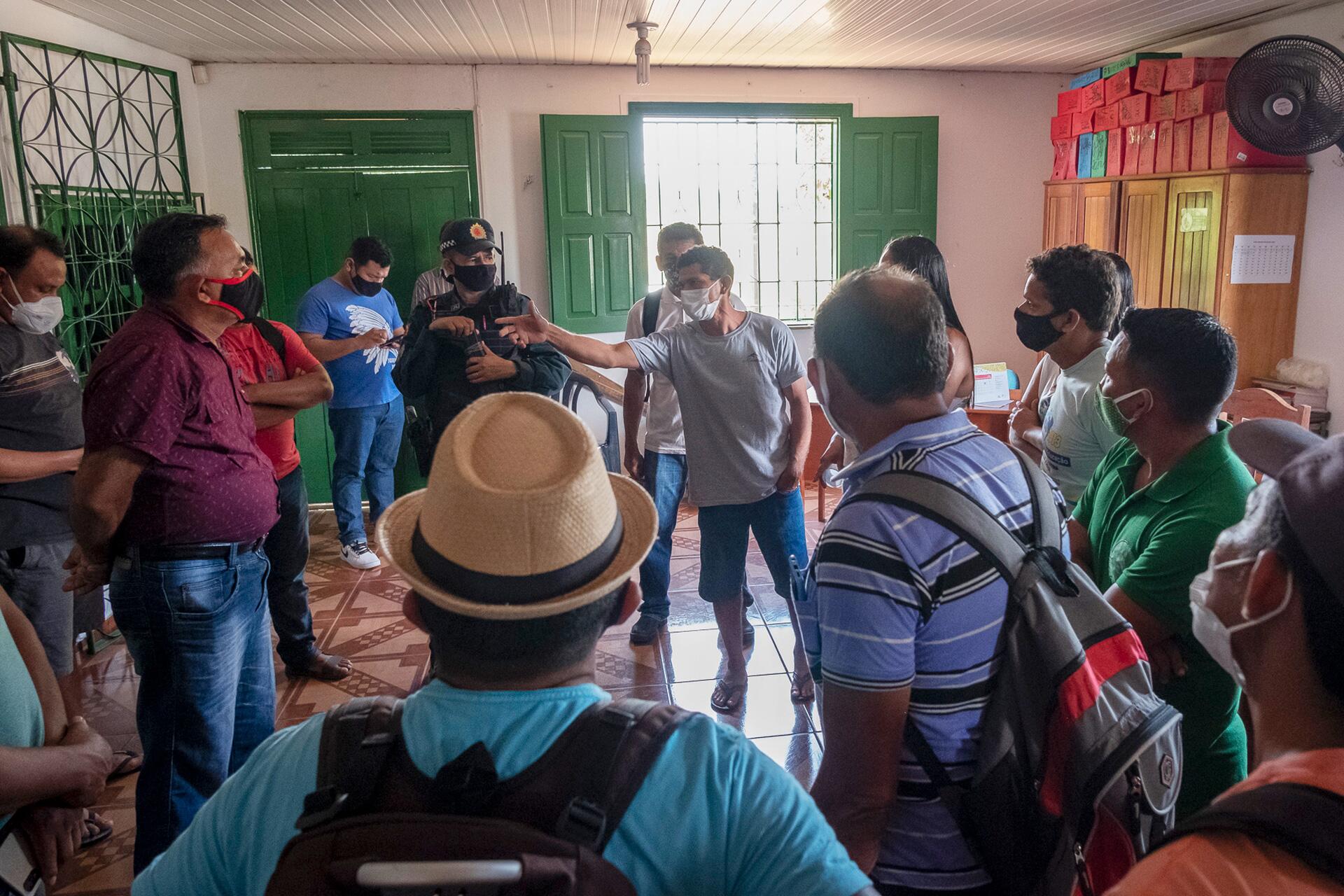
The Union of Rural Workers of Santarém was invaded in May 2021 by cooperative members in the Tapajós-Arapiuns Resex, who demanded that timber management, suspended by a court ruling, be brought back to the area. Photo: Leonardo Milano/Amazônia Real
In the Tapajós National Forest, the first conservation unit to invest in timber management, recent years have seen the creation of cooperatives – suspected of having timber companies behind them – that are asking for ambitious “management plans,” while also fostering discord and conflict among residents, according to one leader who spoke to SUMAÚMA.
Through the Access to Information Act, ICMBio said that the “Federal Prosecutor’s Office in Altamira found indications of irregular practices” at the Verde para Sempre Resex and that the commission’s work to investigate those responsible was concluded on December 15. When asked, the Public Prosecutor’s Office said civil inquiry proceedings are being held under seal. The court proceedings on the Tapajós-Arapiuns Resex are also under seal.
Warning signs in Terra do Meio
The case of the Riozinho do Anfrísio Resex, in Terra do Meio, Pará, is different. Permission has yet to be granted for timber management in this territory – there are, however, some people organizing for this to happen. Nevertheless, the way the process has been conducted has set alarm bells ringing at ICMBio and among some Ribeirinhos.
In 2022, the Association of Residents of the Riozinho do Anfrísio Extractive Reserve (or Amora, its acronym in Portuguese) signed a “technical and financial cooperation agreement” with the Alliance of Old-Growth Forest Managers of Rurópolis Association to create a timber management plan in the community. The document details the responsibilities of each association and states that they are both there to “combine efforts for mutual cooperation.” It lauds some reserves’ management plans, including ones in the Verde para Sempre Resex that are under investigation, and it says that “the community [of Riozinho] had economic losses of between 103 million and 204 million Brazilian reals [around US$ 20 to 40 million]” from illegal timber exploration in the territory.
The document, signed in September 2022, was passed around. SUMAÚMA was in the community of Morro do Anfrísio to hear leaders’ critiques that everything is being done in a haphazard way. They criticize the fact that the community had no chance to provide input before the agreement was signed by the Association’s president, Herculano Camilo de Oliveira Filho, a Ribeirinho who goes by the name Loro.
In addition to the agreement, the Alliance of Managers of Rurópolis confirmed that it gave Amora “a motorcycle, a computer, and an internet access system” and that it also provided financial support for trips by community representatives.
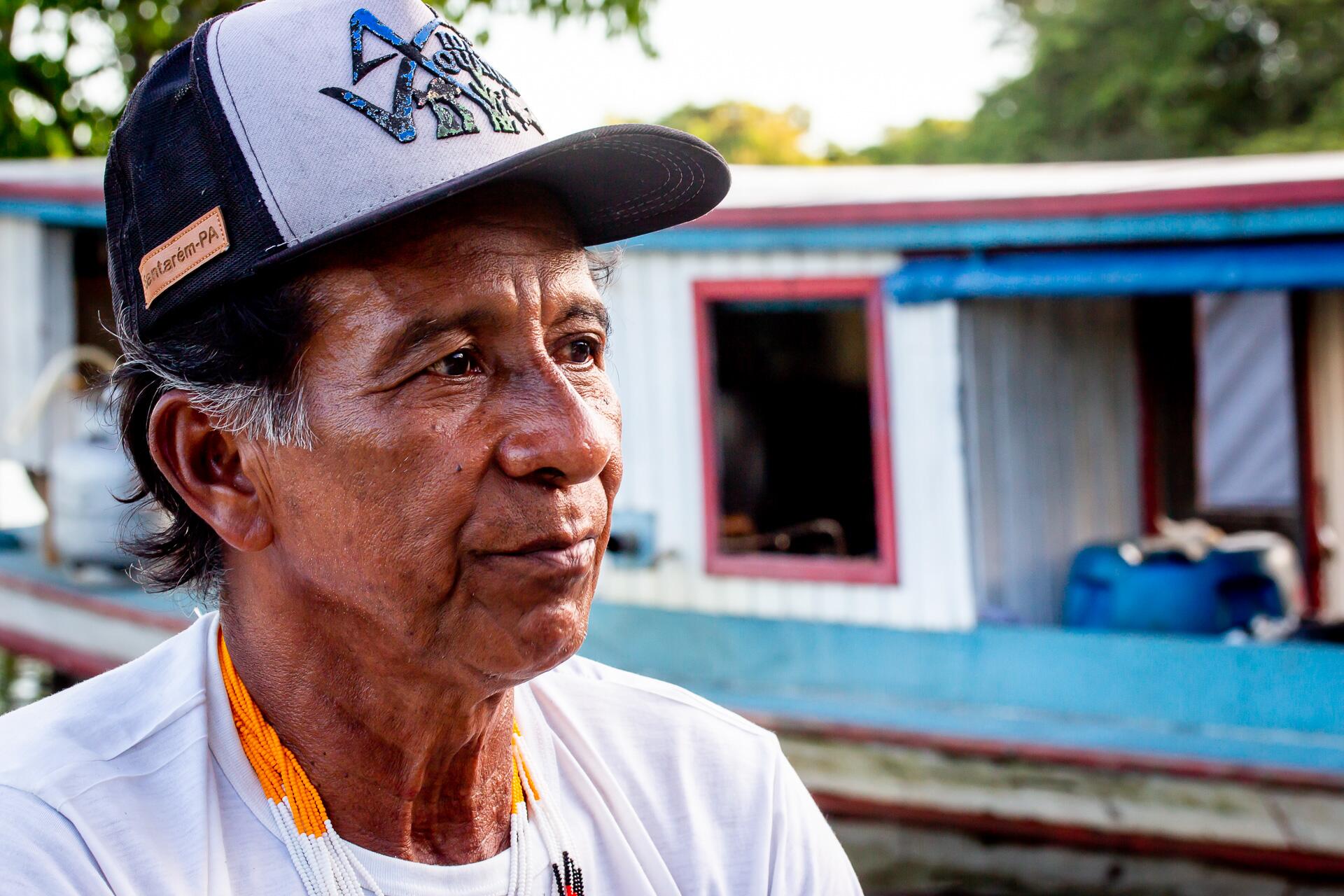
Francisco dos Santos is against a timber management plan in Riozinho do Anfrísio with outside partners: ‘There will be conflict,’ he says. Photo: Soll/SUMAÚMA
The community is on alert – and divided. While some see timber management as a way to generate income for residents – and as a way to reduce illegal extraction within the territory – others fear what could happen if the project is authorized.
An ICMBio employee said that there are warning signs in the commitment agreement signed. These include the lauding of management plans that are under investigation along with inflated timber prices. Under national rules, a community association needs neither a partner nor a contract to approve a project with ICMBio.
Not only is there community timber management, but there are also corporate concessions. Whether they are community-based or not, one problem is that management plans can be used to “launder” illegally extracted timber – in a market dominated by illegality. An Imazon survey shows that 46% of timber exploration in Pará (between August 2021 and July 2022) took place in unauthorized areas.
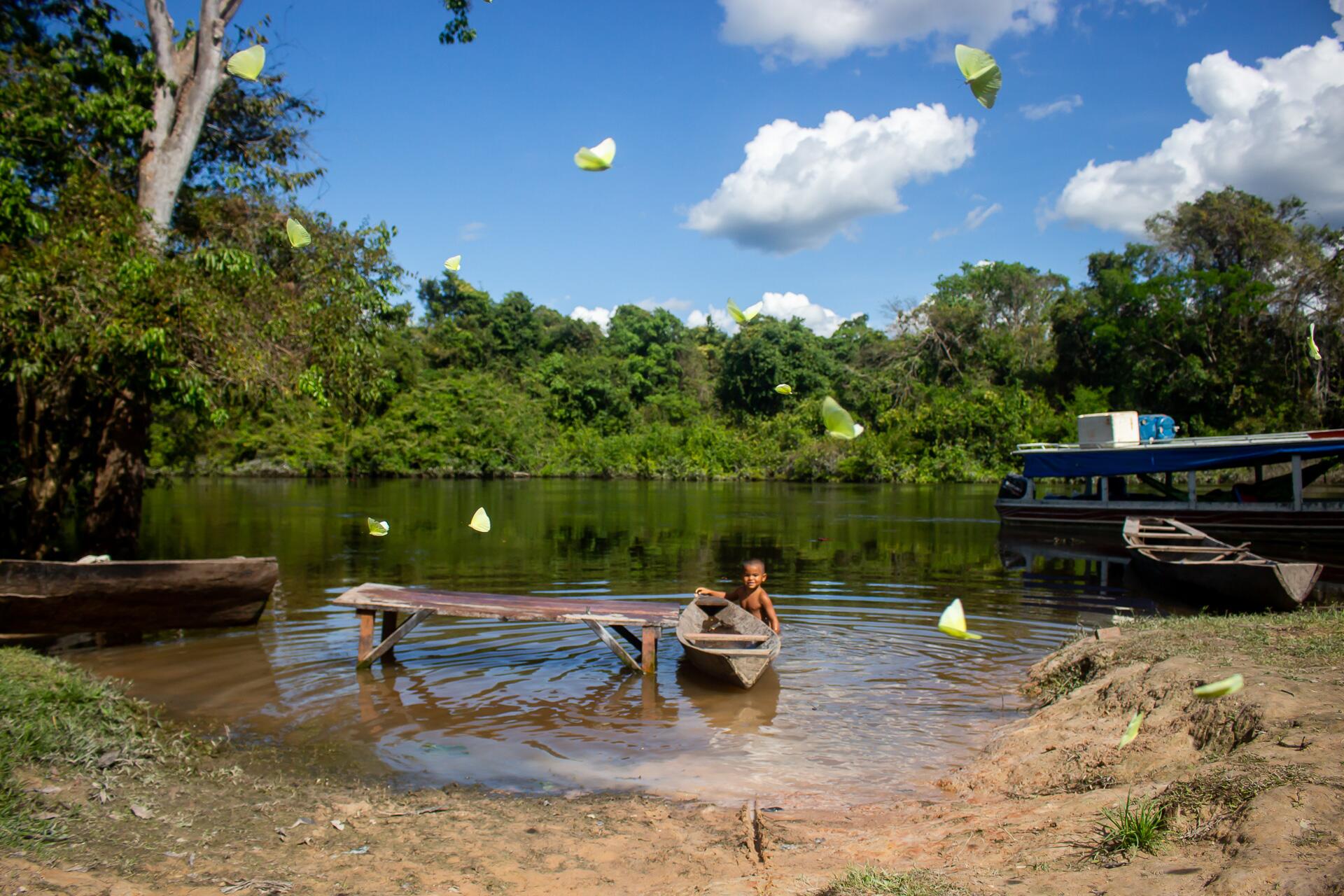
The Morro do Anfrísio community with the preserved forest in the background; illegal deforestation in the reserve has grown since 2017. Photo: Soll/SUMAÚMA
The curious past of the Rurópolis crew
The room is packed in Rurópolis’s City Hall. There is a single woman among the fourteen people in attendance. “We’re discussing the signature of the cooperation agreement between the two associations with the consent of the mayor’s office and the city commission of Rurópolis,” explains Rodrigo Rabelo, a forest engineer, in a video posted in May to the City Hall’s social media. Two other leading players gave interviews: Diego Barbosa, an attorney, and Tarcísio Feitosa, listed in the report’s credits as an environmentalist. “If management is done well, it will create jobs for 400 families in Rurópolis and 102 families in the Resex,” he says.

Video posted in May to the social media of the City Hall of Rurópolis of discussions on the cooperation agreement signed between a community association and an association of timber managers. Photo: Screenshot
Rodrigo Rabelo lists himself as a forest engineer on his LinkedIn page. What his social media doesn’t say is that he is a defendant in court, along with his father, Ilando Lemos Rabelo, and the Madeiras Rabelo timber company (Indústria e Comércio de Madeiras Rabelo LTDA), facing charges of environmental crime and illegal deforestation of seventy-three hectares in the Rurópolis region. The civil public action brought by the Federal Public Prosecutor’s Office is based on a 2020 inspection by Ibama, Brazil’s environmental agency, which found irregularities and levied a fine of R$ 367,000 (around US$ 70,000).
Tarcísio Feitosa has an interesting story. A quick search finds an Amazonian who received an international award in 2006, the Goldman Prize, which was shared with noted environmentalists like Marina Silva. A note says that he reported illegal timber extraction in the region and worked to advance demarcation of protected areas in the Terra do Meio region, also in the early 2000s.
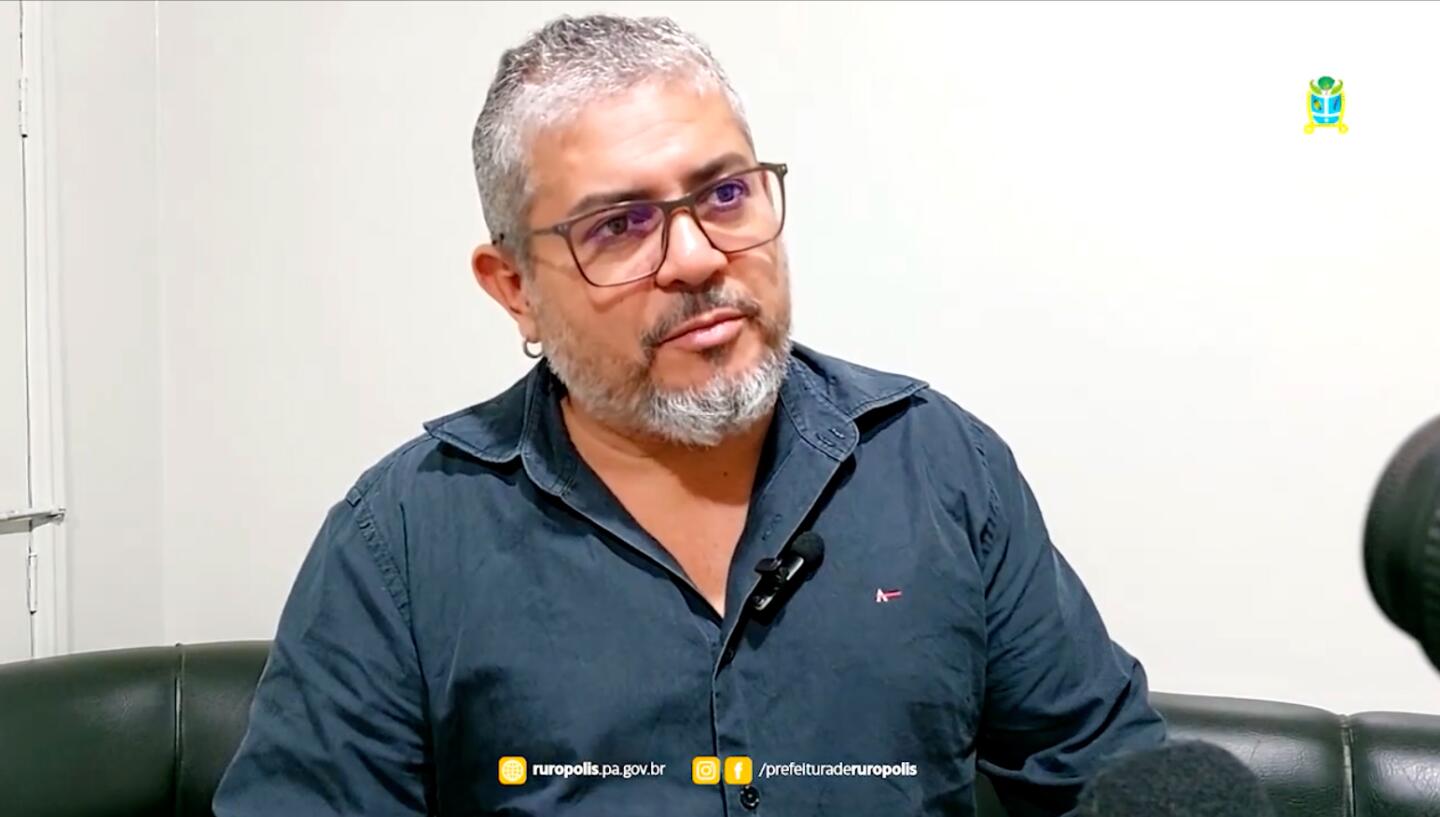
In a video posted to the social media of the City Hall of Rurópolis, Tarcísio Feitosa advocates for timber management plans in protected areas
More than twenty years later, Feitosa has become a community timber management defender and organizer. “Management brings protection to the territory, it generates income for these communities and it generates jobs for young people,” Feitosa told SUMAÚMA. He says that he first got involved in July 2022, when Loro, the Amora president, came to him and said he was interested in a timber management plan in the Resex. One month later, he said he was sought out by the deputy mayor of Rurópolis, Erzenir Orben (Brazilian Democratic Movement), who is part of the association of managers and was also interested in working with management plans in Pará.
When asked whether he knows that Ilando, the president of the Alliance of Managers, is being accused in court of committing an environmental crime, Feitosa quickly responds: “Everyone’s a defendant. Who isn’t?” Regarding criticism from the residents of Riozinho that signature of the agreement was “haphazard,” he says: “There’s one association that has autonomy, there’s another association that has autonomy and they need to be respected.” Feitosa also says that he is paid a daily fee of US$ 100 through the office of his son, Diego Barbosa. In a statement, he said that he would not comment on accusations made by the ICMBio employee.
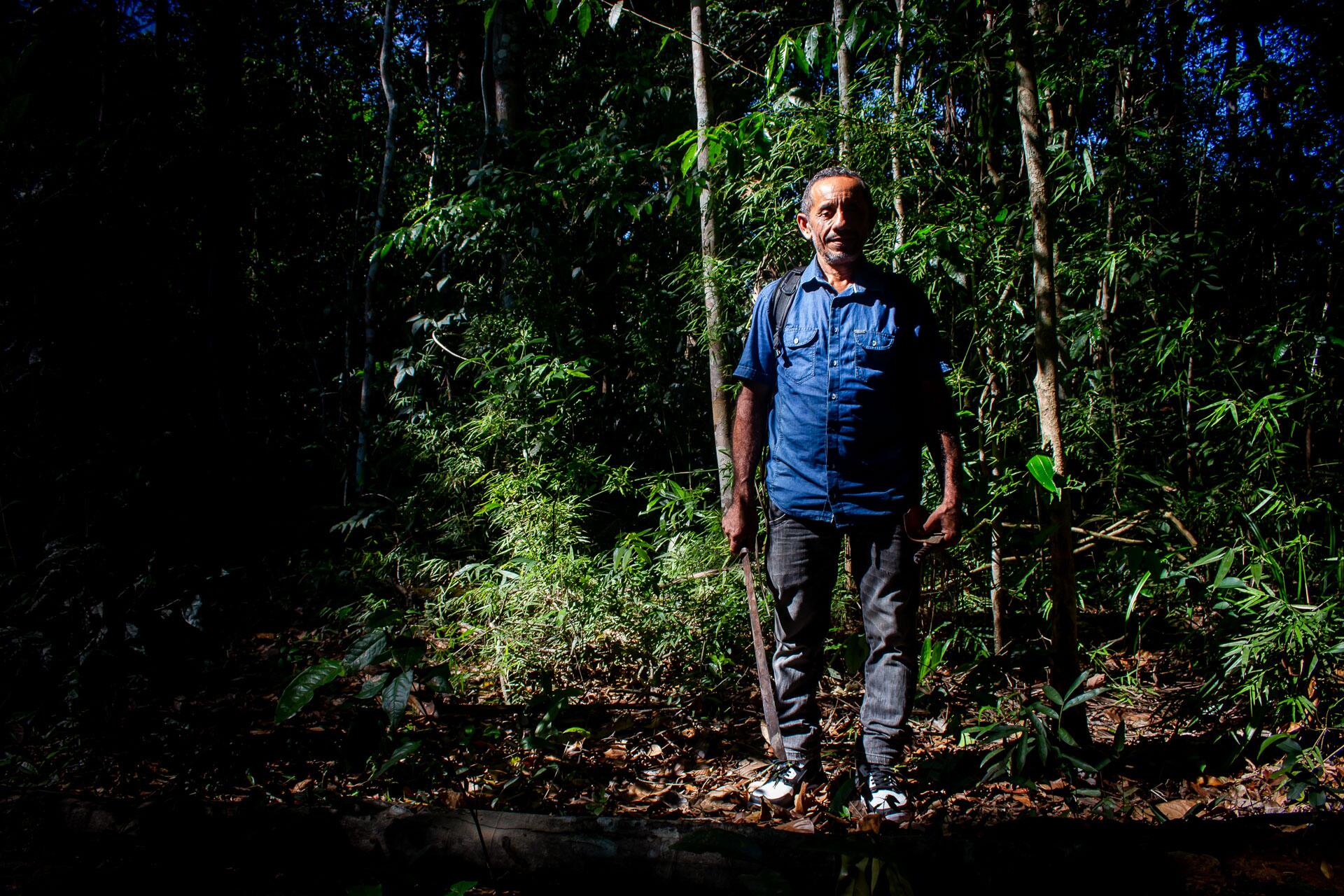
‘What’s the interest? How many outsiders will want to come?’ are questions asked by Pedro Pereira, a resident of the Riozinho do Anfrísio Resex, when discussing the possible creation of a timber management project in the territory. Photo: Soll/ SUMAÚMA
Ilando and Rodrigo Rabelo told SUMAÚMA that the Ibama inspection report “is faulty and will surely be nullified.” They said the fine was levied because of two abandoned logs of which “the company was unaware.” Regarding divisions in the community, their statement said that a possible management plan would reduce illegality, “so there will be people opposed to this activity.”
Attorney Diego Barbosa said he is under contract with the Alliance of Managers of Rurópolis to “provide consulting and legal advice.” Regarding criticism from Resex residents, Barbosa pointed out that the community is made up of over 130 families and that it would be “hard to find consensus among everyone.”
The City Hall of Rurópolis did not respond to SUMAÚMA’s e-mails. Attempts were made to contact Erzenir Orben through City Hall, but there was no reply.
Herculano “Loro” Filho told SUMAÚMA that he did not continue the partnership with the Rurópolis crew once he found that the proposal did not have everyone’s support in the community and after speaking with ICMBio employees. He said he did not know about the court proceedings connected to the president of the Alliance of Managers and that he made a mistake by not talking to the community before signing the agreement. In relation to the motorcycle donated to the Association, Loro said it was not returned, because it is for everyone in the community to use – and it’s important in emergencies, as it allows residents to leave the reserve by land.
‘We can’t compete with illegality’
Just four kilometers from Morro do Anfrísio, the administrative center of the Resex, a clandestine road is used by loggers to distribute timber cut illegally, according to residents. The onslaught against the forest doesn’t escape satellites: deforestation in the territory has grown since 2017 and the number of new roads reached record highs in 2018 and 2020. While the Rio Xingu and Rio Iriri Resexes respectively saw 6 and 26 hectares of deforestation from 2019 to 2022, the Riozinho Resex had 1,632 hectares deforested, according to data compiled by Instituto Socioambiental (ISA). Over these four years, 319 kilometers of clandestine roadways were opened up within the Riozinho Resex to move logs.
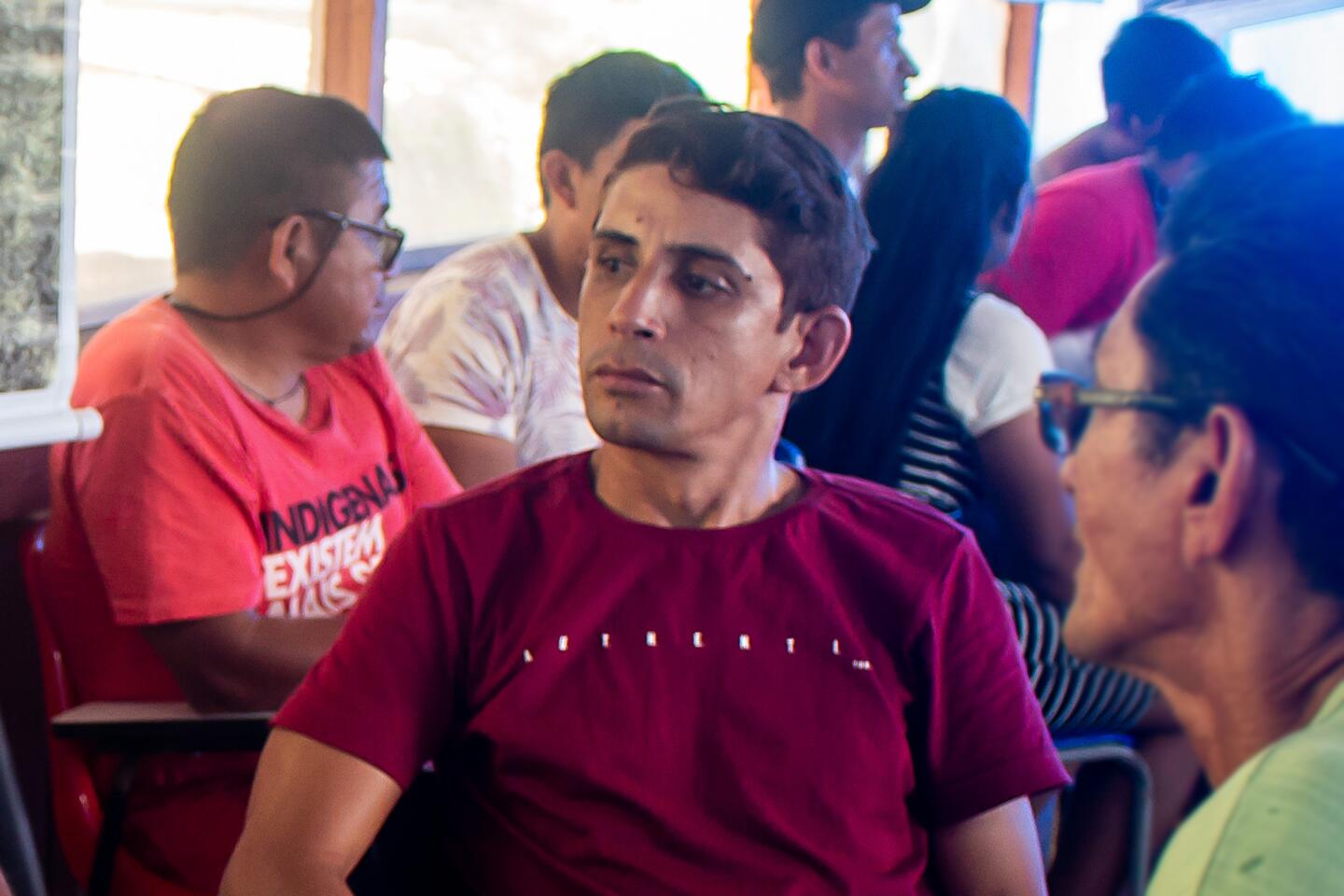
The current president of the association of residents, Herculano ‘Loro’ Filho, who signed a partnership agreement with managers from Rurópolis. Photo: Soll/SUMAÚMA
Older residents, with their lasting memories of a time prior to the Resex’s creation in 2004 when illegality ruled the territory, are usually opposed to a timber management plan. “A criminal who comes and tries to perpetrate a crime and irregularity in a region like this, if he finds everyone organized when he arrives, he can’t move forward. Now, if he arrives and finds it easy, this becomes a crazy endeavor, which is what is happening here,” says Francisco de Assis Porto de Oliveira, 60, a resident of the Rio Iriri Resex. Although he formerly worked in illegal mining operations, he now calls himself a proud guardian of the forest. But he lowers his eyes when talking about a harsh reality: “We can’t compete with illegality.” Illegality pays well.
While there is a dispute, albeit incipient, in the Riozinho Resex about whether or not they want a management plan, in the Verde para Sempre Resex there is a process of learning from past mistakes. “The communities made a mistake, but they’re being punished. This year they’re not going to sell [timber], [which is] income that will be missing from the families’ pocketbooks,” laments a leader who requested anonymity for security reasons, referring to the intervention by the Public Prosecutor’s Office and a freeze on the approval of new plans in the Resex. “And timber companies, how are they being punished?” she asks.
The question echoes.
Fact-checker: Plínio Lopes
Proofreader (Portuguese): Valquíria Della Pozza
Spanish translation: Meritxell Almarza
English translation: Sarah J. Johnson
Photo Editor: Lela Beltrão
Layout and finishing: Érica Saboya
Editors: Malu Delgado (news and content), Viviane Zandonadi (editorial workflow and copy editing), and Talita Bedinelli (coordination)
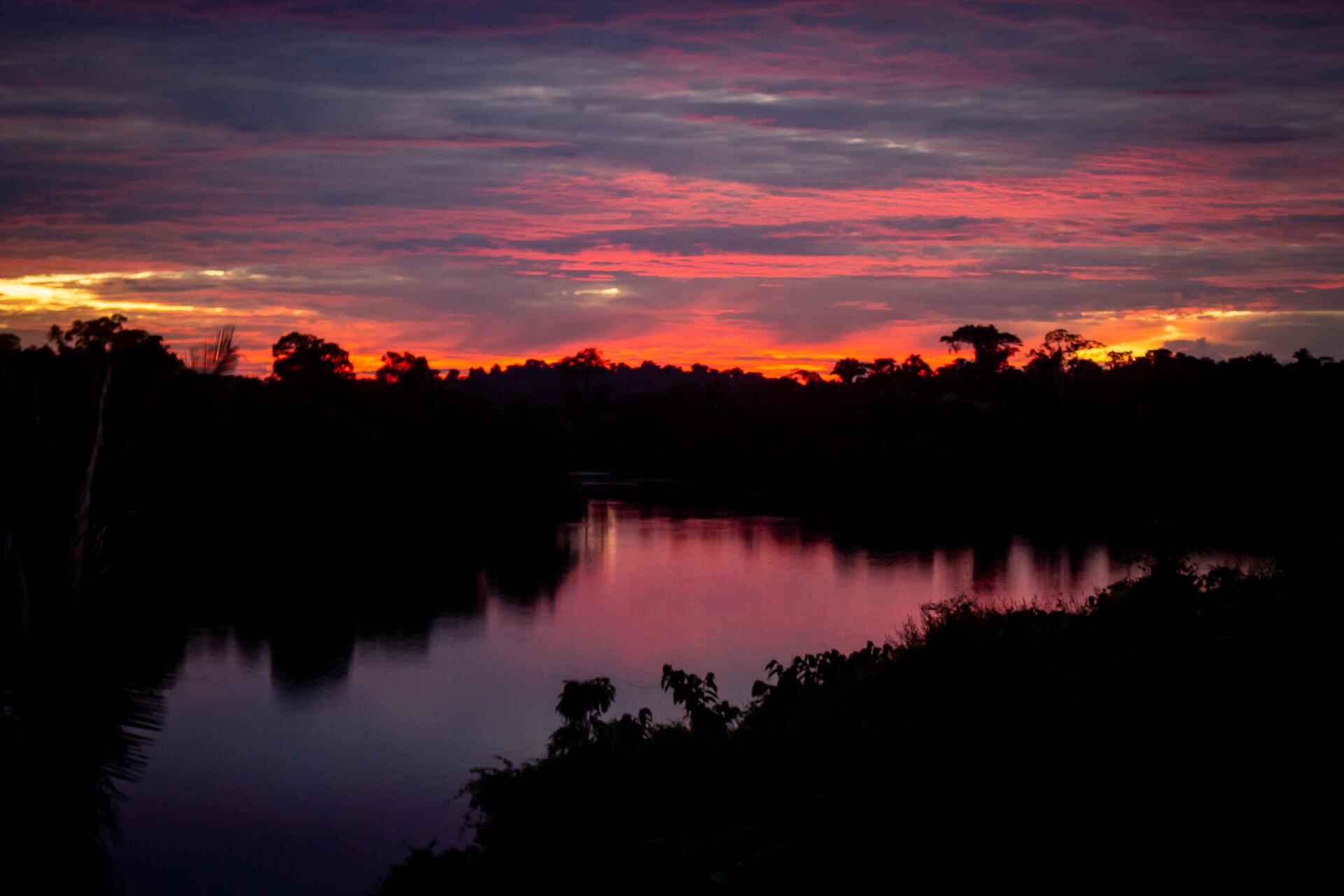
Sunrise reflected on the Iriri River, in the community of São Francisco, in Terra do Meio, a set of protected areas that began to be created in the 2000s. Photo: Soll/SUMAÚMA






